Origin Read online
Page 13
"The match I received," Winston said, "was for an ancient alchemical symbol--amalgamation."
I beg your pardon? Langdon had expected the logo of a parking garage or a political organization. "The car sticker shows the symbol for ... amalgamation?"
Fonseca looked on, clearly lost.
"There must be some mistake, Winston," Langdon said. "Why would anyone display the symbol for an alchemical process?"
"I don't know," Winston replied. "This is the only match I got, and I'm showing ninety-nine percent correspondence."
Langdon's eidetic memory quickly conjured the alchemical symbol for amalgamation.
"Winston, describe exactly what you see in the car window."
The computer replied immediately. "The symbol consists of one vertical line crossed by three transverse lines. On top of the vertical line sits an upward-facing arch."
Precisely. Langdon frowned. "The arch on top--does it have capstones?"
"Yes. A short horizontal line sits on top of each arm."
Okay then, it's amalgamation.
Langdon puzzled for a moment. "Winston, can you send us the photo from the security feed?"
"Of course."
"Send it to my phone," Fonseca demanded.
Langdon relayed the agent's cell-phone number to Winston, and a moment later, Fonseca's device pinged. They all gathered around the agent and looked at the grainy black-and-white photo. It was an overhead shot of a black sedan in a deserted service alley.
Sure enough, in the lower-left-hand corner of the windshield, Langdon could see a sticker displaying the exact symbol Winston had described.
Amalgamation. How bizarre.
Puzzled, Langdon reached over and used his fingertips to enlarge the photo on Fonseca's screen. Leaning in, he studied the more detailed image.
Immediately Langdon saw the problem. "It's not amalgamation," he announced.
Although the image was very close to what Winston had described, it was not exact. And in symbology, the difference between "close" and "exact" could be the difference between a Nazi swastika and a Buddhist symbol of prosperity.
This is why the human mind is sometimes better than a computer.
"It's not one sticker," Langdon declared. "It's two different stickers overlapping a bit. The sticker on the bottom is a special crucifix called the papal cross. It's very popular right now."
With the election of the most liberal pontiff in Vatican history, thousands of people around the globe were showing their support for the pope's new policies by displaying the triple cross, even in Langdon's hometown of Cambridge, Massachusetts.
"The U-shaped symbol on top," Langdon said, "is a separate sticker entirely."
"I now see you are correct," Winston said. "I'll find the phone number for the company."
Again Langdon was amazed by Winston's speed. He's already identified the company logo? "Excellent," Langdon said. "If we call them, they can track the car."
Fonseca looked bewildered. "Track the car! How?"
"This getaway car was hired," Langdon said, pointing to the stylized U on the windshield. "It's an Uber."
CHAPTER 26
FROM THE LOOK of wide-eyed disbelief on Fonseca's face, Langdon couldn't tell what surprised the agent more: the quick decryption of the windshield sticker, or Admiral Avila's odd choice of getaway car. He hired an Uber, Langdon thought, wondering if the move was brilliant or incredibly shortsighted.
Uber's ubiquitous "on-demand driver" service had taken the world by storm over the past few years. Via smartphone, anyone requiring a ride could instantly connect with a growing army of Uber drivers who made extra money by hiring out their own cars as improvised taxis. Only recently legalized in Spain, Uber required its Spanish drivers to display Uber's U logo on their windshields. Apparently, the driver of this Uber getaway car was also a fan of the new pope.
"Agent Fonseca," Langdon said. "Winston says he has taken the liberty of sending the image of the getaway car to local authorities to distribute at roadblocks."
Fonseca's mouth fell open, and Langdon sensed that this highly trained agent was not accustomed to playing catch-up. Fonseca seemed uncertain whether to thank Winston or tell him to mind his own damn business.
"And he is now dialing Uber's emergency number."
"No!" Fonseca commanded. "Give me the number. I'll call myself. Uber will be more likely to assist a senior member of the Royal Guard than they will a computer."
Langdon had to admit Fonseca was probably right. Besides, it seemed far better that the Guardia assist in the manhunt than waste their skills transporting Ambra to Madrid.
After getting the number from Winston, Fonseca dialed, and Langdon felt rising confidence that they might catch the assassin in a matter of minutes. Locating vehicles was at the heart of Uber's business; any customer with a smartphone could literally access the precise locations of every Uber driver on earth. All Fonseca would need to do was ask the company to locate the driver who had just picked up a passenger behind the Guggenheim Museum.
"!Hostia!" Fonseca cursed. "Automatizada." He stabbed at a number on his keypad and waited, apparently having reached an automated list of menu options. "Professor, once I get through to Uber and order a trace on the car, I will be handing this matter over to local authorities so Agent Diaz and I can transport you and Ms. Vidal to Madrid."
"Me?" Langdon replied, startled. "No, I can't possibly join you."
"You can and you will," Fonseca declared. "As will your computer toy," he added, pointing to Langdon's headset.
"I'm sorry," Langdon responded, his tone hardening. "There is no way I can accompany you to Madrid."
"That's odd," Fonseca replied. "I thought you were a Harvard professor?"
Langdon gave him a puzzled look. "I am."
"Good," Fonseca snapped. "Then I assume you're smart enough to realize you have no choice."
With that, the agent stalked off, returning to his phone call. Langdon watched him go. What the hell?
"Professor?" Ambra had stepped very close to Langdon and whispered behind him. "I need you to listen to me. It's very important."
Langdon turned, startled to see that Ambra's expression was one of profound fear. Her mute shock seemed to have passed, and her tone was desperate and clear.
"Professor," she said, "Edmond showed you enormous respect by featuring you in his presentation. For this reason, I'm going to trust you. I need to tell you something."
Langdon eyed her, uncertain.
"Edmond's murder was my fault," she whispered, her deep brown eyes welling with tears.
"I beg your pardon?"
Ambra glanced nervously at Fonseca, who was now out of earshot. "The guest list," she said, returning to Langdon. "The last-minute addition. The name that was added?"
"Yes, Luis Avila."
"I am the person who added that name," she confessed, her voice cracking. "It was me!"
Winston was correct ..., Langdon thought, stunned.
"I'm the reason Edmond was murdered," she said, now on the verge of tears. "I let his killer inside this building."
"Hold on," Langdon said, placing a hand on her trembling shoulder. "Just talk to me. Why did you add his name?"
Ambra shot another anxious glance at Fonseca, who was still on the phone twenty yards away. "Professor, I received a last-minute request from someone I trust deeply. He asked me to add Admiral Avila's name to the guest list as a personal favor. The request came only minutes before the doors opened, and I was busy, so I added the name without thinking. I mean, he was an admiral in the navy! How could I possibly have known?" She looked again at Edmond's body and covered her mouth with a slender hand. "And now ..."
"Ambra," Langdon whispered. "Who was it that asked you to add Avila's name?"
Ambra swallowed hard. "It was my fiance ... the crown prince of Spain. Don Julian."
Langdon stared at her in disbelief, trying to process her words. The director of the Guggenheim had just claimed that the crown
prince of Spain had helped orchestrate the assassination of Edmond Kirsch. That's impossible.
"I'm sure the palace never expected I would learn the killer's identity," she said. "But now that I know ... I fear I'm in danger."
Langdon put a hand on her shoulder. "You're perfectly safe here."
"No," she whispered forcefully, "there are things going on here that you don't understand. You and I need to get out. Now!"
"We can't run," Langdon countered. "We'll never--"
"Please listen to me," she urged. "I know how to help Edmond."
"I'm sorry?" Langdon sensed that she was still in shock. "Edmond can't be helped."
"Yes, he can," she insisted, her tone lucid. "But first, we'll need to get inside his home in Barcelona."
"What are you talking about?"
"Please just listen to me carefully. I know what Edmond would want us to do."
For the next fifteen seconds, Ambra Vidal spoke to Langdon in hushed tones. As she talked, Langdon felt his heart rate climbing. My God, he thought. She's right. This changes everything.
When she was finished, Ambra looked up at him defiantly. "Now do you see why we need to go?"
Langdon nodded without hesitation. "Winston," he said into his headset. "Did you hear what Ambra just told me?"
"I did, Professor."
"Were you already aware of this?"
"No."
Langdon considered his next words very carefully. "Winston, I don't know if computers can feel loyalty to their creators, but if you can, this is your moment of truth. We could really use your help."
CHAPTER 27
AS LANGDON MOVED toward the podium, he kept one eye on Fonseca, who was still engrossed in his phone call to Uber. He watched as Ambra drifted casually toward the center of the dome, talking on her phone too--or at least pretending to talk--precisely as Langdon had suggested.
Tell Fonseca you decided to call Prince Julian.
As Langdon reached the podium, he reluctantly turned his gaze to the crumpled form on the floor. Edmond. Gently, Langdon pulled back the blanket that Ambra had placed over him. Edmond's once bright eyes were now two lifeless slits below a crimson hole in his forehead. Langdon shuddered at the gruesome image, his heart pounding with loss and rage.
For an instant, Langdon could still see the young mop-haired student who had entered his class full of hope and talent--and had gone on to accomplish so much in so brief a time. Horrifically, tonight, someone had murdered this astonishingly gifted human being, almost certainly in an attempt to bury his discovery forever.
And unless I take bold action, Langdon knew, my student's greatest accomplishment will never see the light of day.
Positioning himself so that the podium was partially blocking Fonseca's line of sight, Langdon knelt down beside Edmond's body, closed his eyes, folded his hands together, and assumed the reverent posture of prayer.
The irony of praying over an atheist almost caused Langdon to smile. Edmond, I know that you of all people don't want anyone praying for you. Don't worry, my friend, I'm not actually here to pray.
As he knelt over Edmond, Langdon fought a rising fear. I assured you the bishop was harmless. If Valdespino turns out to be involved in this ... Langdon pushed it from his mind.
Once he felt certain that Fonseca had spotted him praying, Langdon very discreetly leaned forward and reached inside Edmond's leather jacket, removing his oversized turquoise phone.
He glanced quickly back toward Fonseca, who was still on the phone and now seemed less interested in Langdon than he did in Ambra, who appeared to be engrossed in her own phone call and was wandering farther and farther away from Fonseca.
Langdon returned his eyes to Edmond's phone and took a calming breath.
One more thing to do.
Gently, he reached down and lifted Edmond's right hand. It already felt cold. Bringing the phone to his fingertips, Langdon carefully pressed Edmond's index finger to the fingerprint recognition disk.
The phone clicked and unlocked.
Langdon quickly scrolled to the settings menu and disabled the password protection feature. Permanently unlocked. Then he slipped the phone into his jacket pocket and covered Edmond's body again with the blanket.
Sirens wailed in the distance as Ambra stood alone in the center of the deserted auditorium and held her cell phone to her ear, pretending to be absorbed in a conversation, all the while very aware of Fonseca's eyes on her.
Hurry, Robert.
A minute ago, the American professor had leaped into action after Ambra had shared with him a recent conversation she'd had with Edmond Kirsch. Ambra told Langdon that two nights ago, in this very room, she and Edmond had been working late on the final details of the presentation when Edmond had taken a break to have his third spinach smoothie of the night. Ambra had noticed how exhausted he looked.
"I've got to say, Edmond," she had said, "I'm not sure this vegan diet is working for you. You're looking pale, and much too thin."
"Too thin?" He laughed. "Look who's talking."
"I'm not too thin!"
"Borderline." He winked playfully at her indignant expression. "As for my being pale, give me a break. I'm a computer geek who sits all day in the glow of an LCD screen."
"Well, you're addressing the entire world in two days, and a little color would do you some good. Either get outside tomorrow or invent a computer screen that gives you a tan."
"That's not a bad idea," he said, looking impressed. "You should patent that." He laughed and then returned his attention to the matter at hand. "So you're clear on the order of events for Saturday night?"
Ambra nodded, glancing down at the script. "I welcome people inside the anteroom, and then we all move into this auditorium for your introductory video, after which you magically appear at the podium over there." She pointed to the front of the room. "And then, at the podium, you make your announcement."
"Perfect," Edmond said, "with one small addition." He grinned. "When I speak at the podium, it will be more of an intermission--a chance for me to welcome my guests in person, let everyone stretch their legs, and prep them a bit more before I begin the second half of the evening--a multimedia presentation that explains my discovery."
"So the announcement itself is prerecorded? Like the intro?"
"Yes, I just finished it a few days ago. We're a visual culture--multimedia presentations are always more gripping than some scientist talking at a podium."
"You're not exactly 'just some scientist,'" Ambra said, "but I agree. I can't wait to see it."
For security purposes, Ambra knew, Edmond's presentation was stored on his own private, trusted, off-site servers. Everything would be live-streamed into the museum projection system from a remote location.
"When we're ready for the second half," she asked, "who will activate the presentation, you or me?"
"I'll do it myself," he said, pulling out his phone. "With this." He held up his oversized smartphone with its turquoise Gaudi case. "It's all part of the show. I simply dial into my remote server on an encrypted connection ..."
Edmond pressed a few buttons and the speakerphone rang once and connected.
A computerized female voice answered. "GOOD EVENING, EDMOND. I AM AWAITING YOUR PASSWORD."
Edmond smiled. "And then, with the whole world watching, I simply type my password into my phone, and my discovery is live-streamed to our theater here and, simultaneously, to the entire world."
"Sounds dramatic," Ambra said, impressed. "Unless, of course, you forget your password."
"That would be awkward, yes."
"I trust you've written it down?" she said wryly.
"Blasphemy," Edmond said, laughing. "Computer scientists never write down passwords. Not to worry, though. Mine is only forty-seven characters long. I'm sure I won't forget it."
Ambra's eyes widened. "Forty-seven?! Edmond, you can't even remember the four-digit PIN for your museum security card! How are you going to remember forty-seven random ch
aracters?"
He laughed again at her alarm. "I don't have to; they're not random." He lowered his voice. "My password is actually my favorite line of poetry."
Ambra felt confused. "You used a line of poetry as a password?"
"Why not? My favorite line of poetry has exactly forty-seven letters."
"Well, it doesn't sound very secure."
"No? You think you can guess my favorite line of poetry?"
"I didn't even know you like poetry."
"Exactly. Even if someone found out that my password was a line of poetry, and even if someone guessed the exact line out of millions of possibilities, they would still need to guess the very long phone number I use to dial into my secure server."
"The phone number you just speed-dialed from your phone?"
"Yes, a phone that has its own access PIN and never leaves my breast pocket."
Ambra threw up her hands, smiling playfully. "Okay, you're the boss," she said. "By the way, who's your favorite poet?"
"Nice try," he said, wagging his finger. "You'll have to wait till Saturday. The line of poetry I've chosen is perfect." He grinned. "It's about the future--a prophecy--and I'm happy to say it's already coming true."
Now, as her thoughts returned to the present, Ambra glanced over at Edmond's body, and realized with a rush of panic that she was no longer able to see Langdon.
Where is he?!
More alarming, she now spotted the second Guardia officer--Agent Diaz--climbing back into the dome through the slit cut into the fabric wall. Diaz scanned the dome and then began moving directly toward Ambra.
He'll never let me out of here!
Suddenly Langdon was beside her. He placed his hand gently on the small of her back and began guiding her away, the two of them moving briskly toward the far end of the dome--the passageway through which everyone had entered.
"Ms. Vidal!" Diaz shouted. "Where are you two going?!"
"We'll be right back," Langdon called, hastening her across the deserted expanse, moving in a direct line toward the rear of the room and the exit tunnel.
"Mr. Langdon!" It was Agent Fonseca's voice, shouting behind them. "You are forbidden to leave this room!"
Ambra felt Langdon's hand pressing more urgently on her back.
"Winston," Langdon whispered into his headset. "Now!"
A moment later, the entire dome went black.

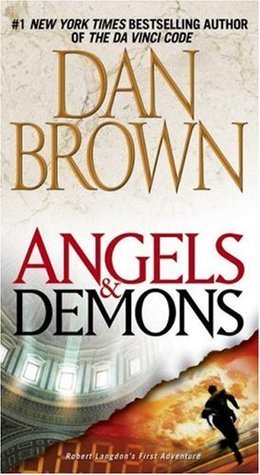 Angels & Demons
Angels & Demons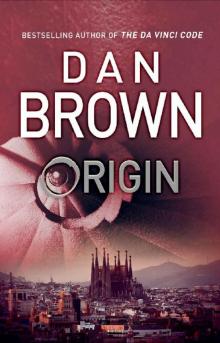 Origin
Origin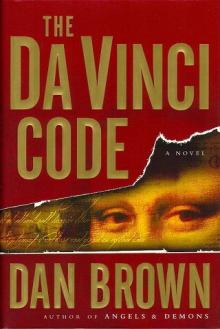 The Da Vinci Code
The Da Vinci Code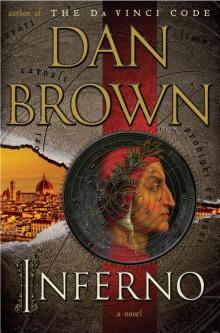 Inferno
Inferno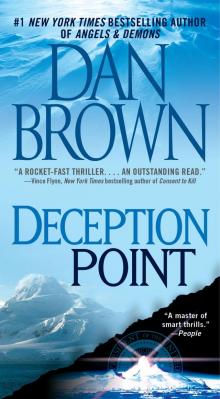 Deception Point
Deception Point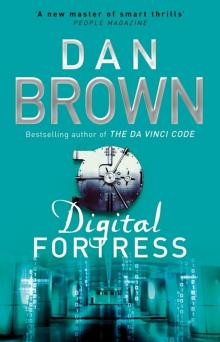 Digital Fortress
Digital Fortress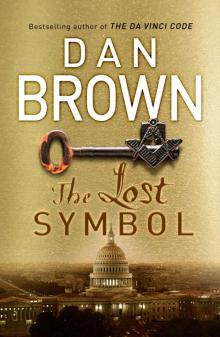 The Lost Symbol
The Lost Symbol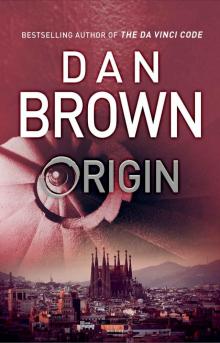 Origin: (Robert Langdon Book 5)
Origin: (Robert Langdon Book 5)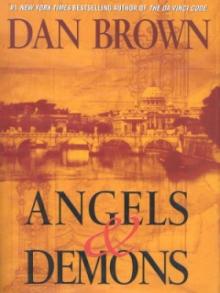 Angles & Demons
Angles & Demons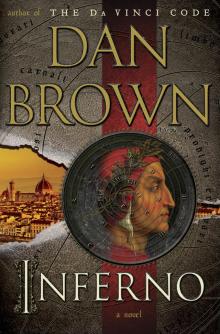 Inferno: A Novel
Inferno: A Novel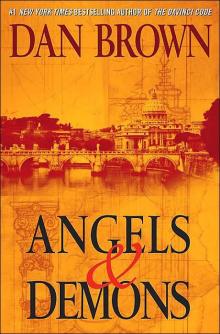 Angels & Demons rl-1
Angels & Demons rl-1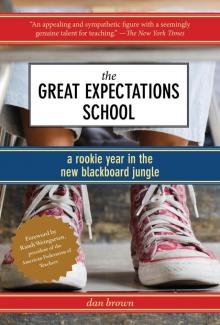 The Great Expectations School
The Great Expectations School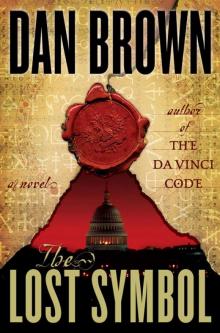 The Lost Symbol rl-3
The Lost Symbol rl-3 Angels and Demons
Angels and Demons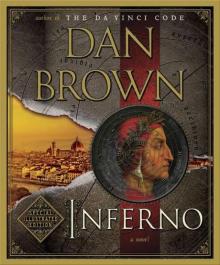 Inferno: Special Illustrated Edition: Featuring Robert Langdon
Inferno: Special Illustrated Edition: Featuring Robert Langdon